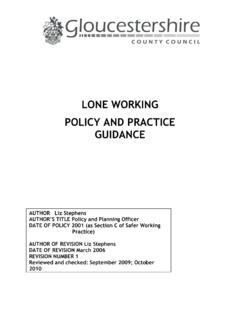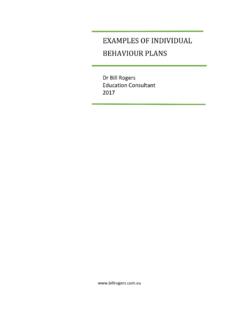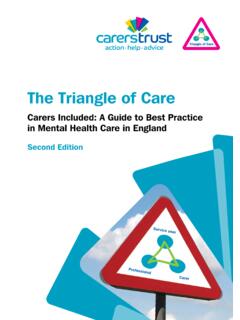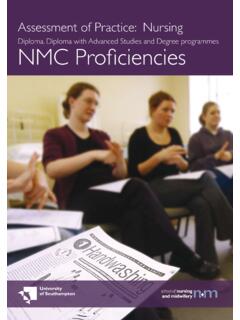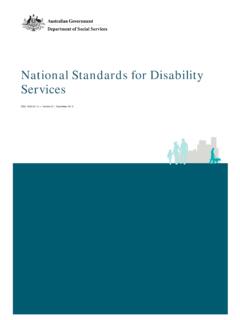Transcription of Relationships between staff and service users/carers
1 COMMUNITY & ADULT CARE DIRECTORATE Relationships between staff AND THE PEOPLE THEY SUPPORT GUIDANCE FOR staff AUTHOR: Liz Stephens AUTHOR S TITLE: Strategic Planning & Policy Officer DATE: December 2007 Replaces staff /Client Relationships policy (2001) Revised & checked: Janet Waters: Strategic Policy & Planning Officer Date: August 2010 2 Relationships between staff and the people they support Guidance for staff Index 1 Introduction 3 2 Legal context 3 3 Relevant policies and procedures 3 4 Scope 4 5 Principles 4 6 Specific areas of concern: Pre-existing Relationships Developing Relationships Confidentiality Communication Cultural and religious differences Intimate personal care Admitting other people to a person s home Visits Additional Work Money, gifts and bequests Property Fostering and Adult Placements 4 5 6 7 8 7 Monitoring 9 8.
2 Implementation 9 3 Relationships between staff and the people they support Community and Adult Care Directorate 1. Introduction The Directorate has a duty of care towards all people who are in receipt of commissioned services or a personal budget to purchase their own care, who by the nature of their needs will often be vulnerable, whether physically or emotionally. Adult care workers must recognise this vulnerability and protect people from exploitation and abuse; they must never take advantage of it for their own purposes. The Directorate also has a duty towards its staff and those of contracted providers, who may sometimes be manipulated or abused by the people they are working with in a professional capacity. This guidance is intended to help all staff maintain a professional relationship with the people they work with, to ensure they are aware of potential difficulties and to help deal with them.
3 The relationship between a social care worker and a person or carer they work with must be based on the eligible assessed needs of the person or their carer and the skills and knowledge of the worker engaged to help meet those needs. They should be aware from their own experience that it is harder to use skills effectively with a friend or relative, where there is an emotional involvement . It is therefore essential that while care staff may develop a close working relationship with a person they must never allow that to cloud their professional judgement. 2. Legal Context Within the working relationship the same laws apply in relation to assault, theft, fraud and other offences as in the wider world. The Mental Capacity Act 2005 has introduced two new criminal offences: ill treatment or wilful neglect of a person who lacks capacity to make relevant decisions (section 44).
4 staff employed under Green Book conditions of employment are subject to a contractual requirement (at ) to maintain conduct of the highest standard such that public confidence in their integrity is sustained . 3. Relevant policies and procedures The following documents give additional relevant information and guidance: National documents: General Social Care Council Code of Conduct Skills for Care NJC for Local Government services (Green Book) Corporate documents: GCC Code of Conduct and confidential reporting procedure Employment handbook Directorate documents: Sharing personal and sensitive information Safer Working Practice Employees who wish to foster/offer adult placements; 4 Helping service users manage their financial and welfare affairs Secondary Employment Equal Opportunities Intimate personal Relationships and sexuality; (Learning Disability) Mental Capacity Act guidance.
5 Protection of service user property Complaints Information management 4. Scope This policy is for all adult social care staff and staff from our independent care providers should be read in conjunction with the County Council s Code of Conduct and any appropriate policies of the care providers. 5. Principles One of the Directorate s core purposes is to assess people s needs and establish the size of the personal budget which will meet those needs. In so doing staff must respect the dignity, privacy, safety and well-being of people. staff must not take advantage of a person s vulnerability or enable others to do so. staff have the right to expect respect from the people they work with. staff need to be aware that failing to comply with these standards may result in formal disciplinary action, including dismissal, in line with the Council Council s Code of Conduct.
6 6. Specific areas of concern There are a number of areas where adult care workers must be particularly careful to avoid any opportunity for actual or perceived exploitation. Pre-existing Relationships It is quite possible that at some point someone who is known or related to an adult care worker will be referred for an assessment of needs. It is the responsibility of the staff member to inform their manager of the relationship, so that they are not directly involved in the assessment or provision. Otherwise they may be perceived to be in a position leading to a conflict of loyalties. It is difficult to provide an effective service to someone already known to adult care staff outside of their work situation it requires a shift in the relationship and in the balance of power to allow adult care staff to ask relevant personal questions or to provide intimate care.
7 There is a risk that the response would not be the most honest or appropriate for their current circumstances. 5 The person concerned may not wish to share some important information, because they would not want to do so in their role as a friend or relative, and might find it difficult to separate that from the new professional role. The person concerned could try to use the relationship to get a better service , or staff might feel an obligation to do so, putting additional emotional pressure on themselves and setting up unrealistic expectations. Developing Relationships When people work closely together with shared aims and objectives, often on a one-to-one basis, it can be easy for a working relationship to develop into something more personal. Up to a point it may be argued that this may make for a more successful outcome, but it is responsibility of the staff member to ensure that the relationship remains on a professional footing at all times.
8 It is necessary to maintain a degree of objectivity in order to make appropriate care assessments and judgements, and to offer appropriate advice. If this objectivity is compromised you must discuss this in supervision and arrange to transfer the work to a colleague if necessary. The expectation for adult social care staff is similar to that for teachers or medical staff ; it is presumed that designated tasks will be carried out in a professional manner, with a degree of objectivity which facilitates fair assessments and appropriate decisions. It is never acceptable to have an intimate relationship with a person known to the Directorate in a professional capacity. Regardless of how the staff member may see the relationship, it leaves them open to allegations of exploitation, abuse of authority, unfairness, harassment or even sexual assault, and is contrary to point of the GSCC Code of Practice: 5 As a social care worker, you must uphold public trust and confidence in social care services .
9 In particular you must not:.. Form inappropriate personal Relationships with service users This does not necessarily preclude Relationships with people who have been known to the Directorate in the past, nor with people currently known to the Directorate but with whom there are no professional links. However in the latter case there needs to be an awareness of the potential for a clash of loyalties, if for example the person is unsatisfied with the service they are receiving. Confidentiality Social care workers need to be aware of the policies and procedures relating to securing and sharing information, and ensure that no personal information about a person with whom you are working is disclosed to an unauthorised person. staff must not attempt to access ERIC records for anyone for whom they do not have a professional responsibility.
10 Social care workers should not share personal information about themselves or their family with people, unless for a clearly defined purpose in relation to the person s situation for example personal experience of a service being offered. In small communities it may be more difficult to maintain confidentiality, and so staff need to be aware of the risks. 6 Adult social care workers should avoid giving people a blanket assurance that they will keep everything they are told confidential. Apart from assessment information, for which consent to share is routinely sought, workers may be given information about abuse, or a medical condition, or a criminal act; once staff have that information, there is a duty to act on it, whether directly or by persuading them to share the information with someone who may be more appropriate to respond.




